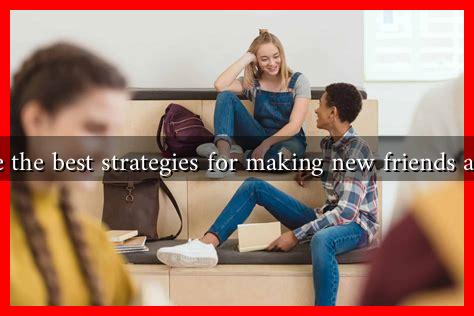-
Table of Contents
What are the Best Strategies for Making New Friends at School?
Making new friends at school can be both exciting and daunting. Whether you are a new student or just looking to expand your social circle, understanding effective strategies can help you forge meaningful connections. This article explores the best strategies for making new friends at school, supported by research and practical examples.
Understanding the Importance of Friendships
Friendships play a crucial role in a student’s life. They provide emotional support, enhance social skills, and contribute to overall well-being. According to a study published in the journal *Child Development*, children with strong friendships tend to have better academic performance and higher self-esteem.
. Therefore, investing time and effort into building friendships is essential for personal growth and success in school.
Strategies for Making New Friends
Here are some effective strategies to help you make new friends at school:
- Be Approachable: Your body language speaks volumes. Smile, maintain open posture, and make eye contact to signal that you are friendly and open to conversation.
- Join Clubs and Activities: Participating in extracurricular activities is a great way to meet like-minded individuals. Whether it’s a sports team, a debate club, or a music group, shared interests can foster friendships.
- Start Conversations: Initiating conversations can be intimidating, but it’s essential. Ask open-ended questions about classes, hobbies, or current events to engage others. For example, “What did you think of the last math test?” can lead to a deeper discussion.
- Be a Good Listener: Show genuine interest in what others have to say. Listening actively can help you connect on a deeper level and make others feel valued.
- Utilize Social Media: Platforms like Instagram and Snapchat can help you connect with classmates outside of school. Share interests and engage in conversations online to strengthen your friendships.
- Be Inclusive: When forming a group, make an effort to include others who may be left out. This not only helps you make friends but also fosters a sense of community.
- Volunteer: Engaging in community service or school events can introduce you to new people while contributing to a good cause. Volunteering can create bonds through shared experiences.
Overcoming Social Anxiety
For many students, social anxiety can be a barrier to making friends. Here are some tips to overcome this challenge:
- Practice Self-Compassion: Understand that everyone feels nervous at times. Be kind to yourself and recognize that making mistakes is part of the learning process.
- Set Small Goals: Start with small interactions, such as greeting a classmate or asking a question. Gradually increase the complexity of your social interactions.
- Seek Support: If anxiety becomes overwhelming, consider talking to a school counselor or trusted adult. They can provide strategies and support to help you navigate social situations.
Case Studies and Real-Life Examples
Many students have successfully made friends by implementing these strategies. For instance, Sarah, a high school freshman, joined the drama club to meet new people. Through rehearsals and performances, she formed close friendships with her fellow cast members, which helped her feel more connected to her school community.
Another example is Jake, who struggled with social anxiety. By setting small goals, such as initiating one conversation per day, he gradually built his confidence and expanded his social circle. His story highlights the importance of persistence and self-compassion in overcoming social barriers.
Conclusion
Making new friends at school is a vital part of the educational experience. By being approachable, engaging in activities, and practicing good communication skills, students can create lasting friendships. Overcoming social anxiety is also crucial, and with the right strategies, anyone can build meaningful connections. Remember, friendships enrich our lives and contribute to our overall happiness and success. So take the first step today—reach out, engage, and embrace the journey of making new friends!
For more tips on building friendships and social skills, consider visiting Verywell Mind.





